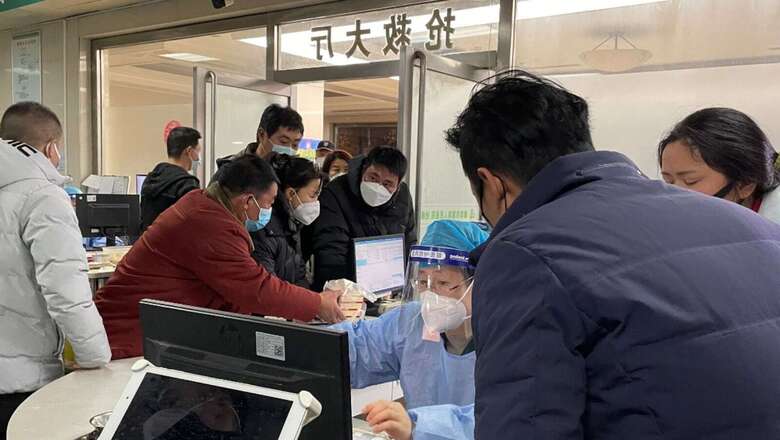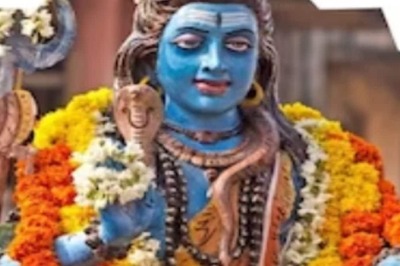
views
China, known for its notoriety along the Line of Actual Control, is now looking up to Indian drugs as medical crisis driven by Covid-19 has hit the country hard. Even as the Indian medicines have not been approved by the Chinese government and selling them is a punishable offence, residents have turned to the black market for generic coronavirus drugs. A new wave of the unprecedented pandemic outbreak that has ramped up the demand for limited supplies of approved antivirals in China.
According to The South China Morning Post, China approved two Covid-19 antivirals this year – Pfizer’s Paxlovid and Azvudine, an HIV drug from Chinese firm Genuine Biotech. But both are only available in certain hospitals.
Their limited supply and steep price have driven many Chinese to opt for cheaper but illegally imported generic drugs from India. Topics like “anti-Covid Indian generic drugs sold at 1,000 yuan (US$144) per box” have been trending on Chinese social media platform Weibo, with users exchanging messages and tips on ways to get hold of the medicines, the report stated.
Another online portal, Tencent News, stated that four kinds of generic anti-Covid drugs from India are being ?sold illegally in the Chinese market? – under the brand names Primovir, Paxista, Molnunat and Molnatris.
While Paxlovid is priced at 2,980 yuan per box, a box of Indian-made drugs can be bought for 530 to 1,600 yuan. Primovir and Paxista are generic versions of Paxlovid, while Molnunat and Molnatris are generics for Merck’s molnupiravir, the report mentioned.
Dr Suneela Garg, Lancet Commission member, told CNN News18, ?Virus sees no border. We have to be watchful. The government has launched immediate measures. We need transparency from China, and be very cautious and focus on vaccination. We have some BF.7 cases in India. We have to be careful and watchful. I am hopeful we will not have a fourth wave.?
Across China, an acute shortage of medicine, videos of people crowding hospitals, and long lines outside crematories and funeral homes marked a stark contrast with the seven deaths reported by the government last week. On December 20, the health authorities explained that only deaths caused by coronavirus-induced pneumonia and respiratory failure would be attributed to Covid.
Aside from general comments about coordinating Covid prevention measures, Xi Jinping has remained silent. He has said nothing directly about the recent surge in cases.
For now, experts said, both the censors and the propaganda officials appear to be scrambling to figure out what to do. “I don’t think I’ve seen a planned or orchestrated propaganda plan coming out. It’s more because the general direction has changed, so the propaganda has to follow suit suddenly,” Fang Kecheng, an assistant professor at the Chinese University of Hong Kong who studies China’s propaganda, was quoted by The New York Times. One major test will come when the virus spreads to smaller, rural areas with insufficient medical resources, he said.
In dire situation, the Chinese residents have devised methods to bypass the censorship. According to The South China Morning Post, under China’s drug administration law, medicines marketed abroad but not approved in China are no longer identified as counterfeit, but those involved in their distribution still face administrative penalties for illegal imports without a licence.
Some e-commerce platforms have put the generics up for sale under ?euphemistic labels to bypass keyword censorship?, the report stated. Public health experts and doctors in China have warned of the potential risks and urged people not to buy medicines from illegal channels, including unlicensed salespersons on messaging app WeChat.
“Marketing queries are coming to (Indian) drug makers asking for quotes on ibuprofen and paracetamol,” Sahil Munjal, chairman of the Pharmaceuticals Export Promotion Council of India (Pharmexcil), was quoted as saying by Reuters last week. ?Ibuprofen and paracetamol are facing a shortage in China at the moment, they are high in demand,? he added.
#BreakingNews: India ready to export fever medicines to #China.@_pallavighosh with details.#Covid #Covid_19 #CovidChina #Pfizer #Omicron | @akankshaswarups pic.twitter.com/IdLs3S5lbC? News18 (@CNNnews18) December 23, 2022
India?s foreign ministry said the country, one of the biggest makers of generic medicines in the world, was ready to help China.
?We are keeping an eye on the Covid situation in China,? foreign ministry spokesperson Arindam Bagchi said at a regular news briefing. ?We have always helped other countries as the pharmacy of the world.?
India?s pharma exports to China accounted for just 1.4% of its overall exports in 2021/22, according to Pharmexcil?s latest annual report. The United States remains India?s largest destination for drugs exports.
Read all the Latest India News here


















Comments
0 comment